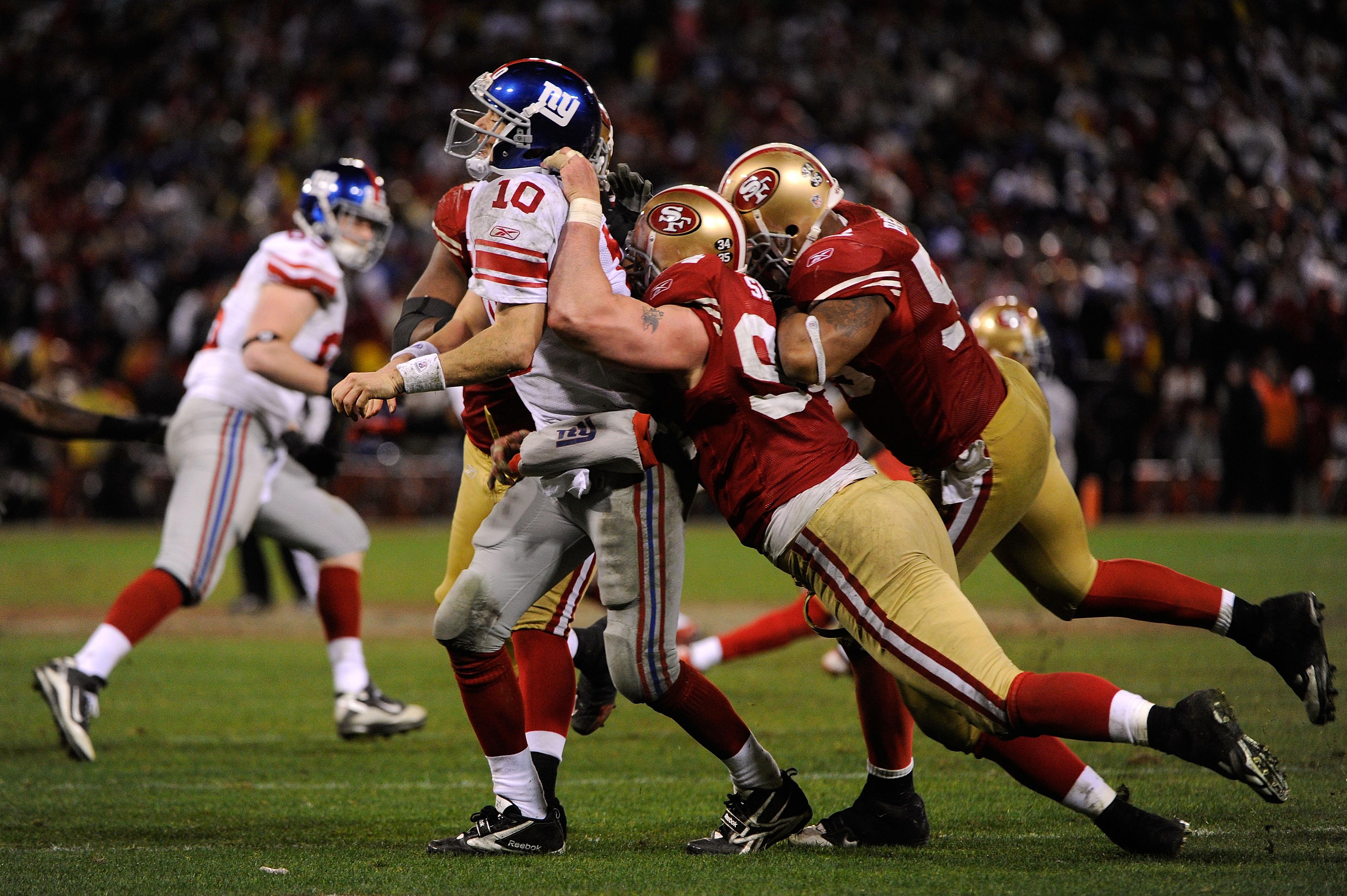My favorite moment of the Giants-49ers game was the shot of Eli Manning in the final minute of the fourth quarter, score tied at 17. Manning, after spinning away from the initial rush, had somehow squeezed off a pass to Ahmad Bradshaw right around the time the 49ers’ Aldon Smith was knocking the quarterback into Sausalito. It was a nice, ballsy little play, the sort of move that made you realize that Eli has a lot more Archie to him than his brother ever did. Manning was left looking like something that had gotten snagged in the blades of your lawnmower. Helmet several degrees out of plumb, pads spilling out of his jersey, chin guard heading north toward his eyeballs, grass all over him. He was the Scarecrow after the flying monkeys had finished with him. He looked bad, and I’ll be damned if, in that Maynard G. Krebs way of his, he didn’t look a little badass, too.
Now, this wasn’t exactly Y.A. Tittle bleeding from the dome, but it was fun watching Manning transmogrify himself into a tough guy. Who knows what to make of Eli Manning anymore? In his time, he has been regarded as a worthy dynastic successor, then a slackjawed legacy punk, then a draft bust, then a barely acceptable mediocrity, then a “game manager” who was good enough not to lose the Giants a Super Bowl, then a braggart, then a rock-ribbed leader of men. He’s improved his touch since his first few years in the league, but he has remained more or less the same quarterback—good, never as bad as his worst critics claimed, never as great as his biggest boosters wanted to believe.
Just good.
We’ve chewed over this a lot in this here space, but it’s worth addressing again, because it’s dawned on me that the single greatest problem with mainstream football analysis right now is its inability to deal with the merely good. We know what great looks like; we know what shit looks like, too. But when confronted with a player or a team that’s only satisfactory, a B at best, we lose all our bearings and get drunk on cheap metaphysics (leadership, clutchness, etc.). The Jets were a good team; they went 8-8 because sometimes good teams go 8-8, not because they were Gomorrah-on-the-Hudson.
The Giants are likewise good, and they have a good quarterback. But good is not enough when there’s bullshit to peddle. Here’s our old pal Rick Reilly wondering if Eli could “end up as the greatest Manning of all.” He writes:
Eli’s playoff record is better than his brother’s. Eli is 6-3 to Peyton’s 9-10.
The scalps on Eli’s belt are better. He got one off Tom Brady and the 18-0 New England Patriots of 2007 in Super Bowl 42. A week ago, he snagged one almost as good: Aaron Rodgers and the 15-1 Green Bay Packers of 2011. Peyton’s signature win? He beat Rex Freaking Grossman.
Eli’s four playoff road wins are tied for most in NFL history. Peyton’s had only two.
Peyton has never thrown for as many yards as Eli did this season (4,933), even with more than half his games in domes.
Eli’s been more Clutch Cargo this season than Peyton ever has. His 15 fourth-quarter TD passes broke the NFL record held by Johnny Unitas (1959) and oh, wait! Peyton Manning (2002).
In a lot of ways, this is just the Tim Tebow debate in Groucho glasses. Reilly is ascribing all the team’s success to a single player, then committing casual atrocities with numbers to prop up an argument he doesn’t really believe in the first place. That road wins stat—which is getting humped all up and down the coverage of the playoffs—has to be the dumbest of all. What it means, if we adopt the Reilly fallacy that a quarterback bears sole responsibility for his team’s fortunes, is that Eli is good enough to compensate for the fact that he wasn’t good enough to secure home-field advantage. Meanwhile, Peyton and his Colts played in three road playoff games total between in 2004 and 2010. You can’t win playoff games on the road when you’re good enough to spend the postseason at home.
What’s crazy about the overinflation of Manning’s credentials is that it runs against the nature of the league. The modern NFL is built on good. It’s a league where the weak can be strong—where a good team can go 9-7 and make the playoffs and perhaps win a Super Bowl, even against a great team. The philosophy of the greatest coach in the NFL right now, Bill Belichick, is largely a philosophy of good—i.e., a roster of useful, fungible players is better than one of a few stars and a lot of spare parts. Good makes the league go ‘round. Embrace it.
